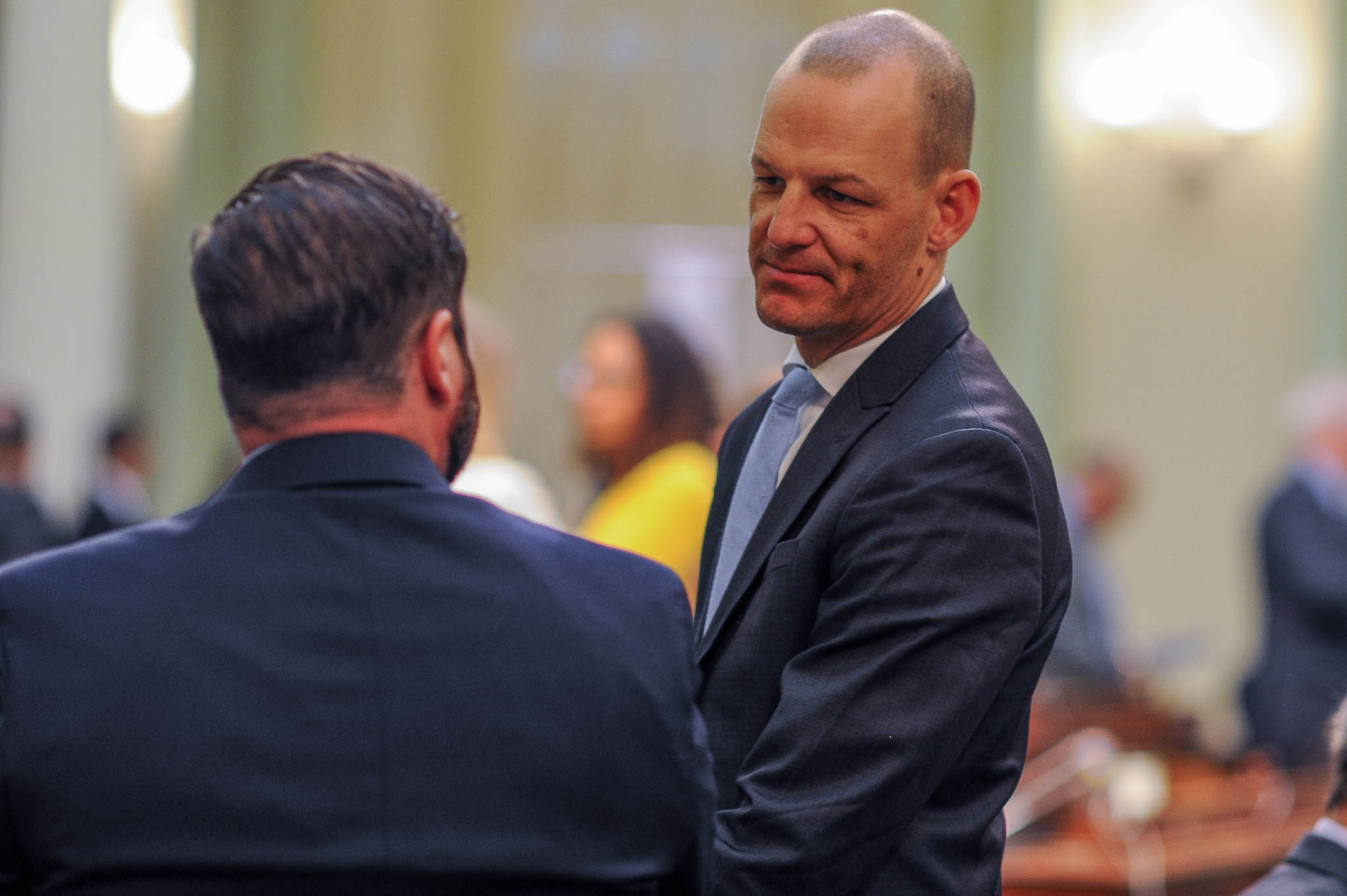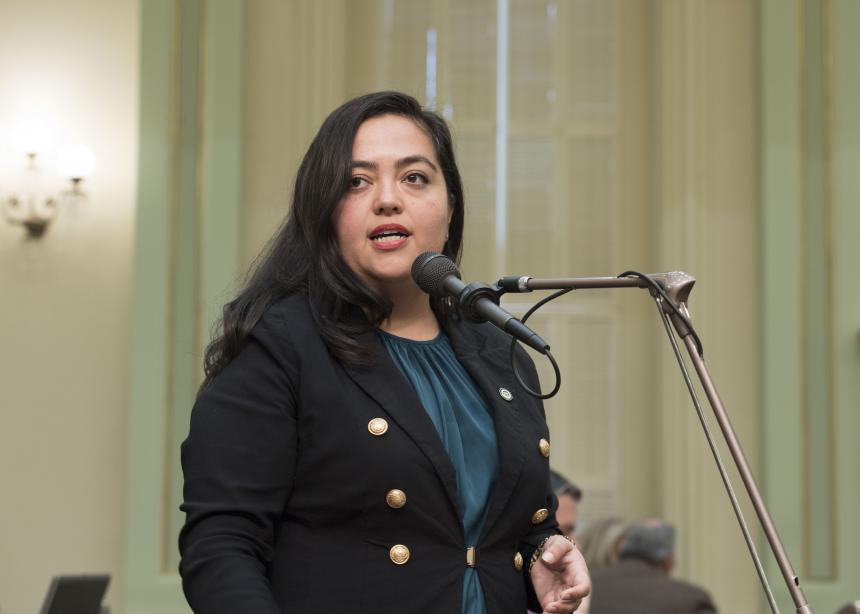
Judge's gavel on courtroom background. Law and justice. (Photo: Zolnierek, Shutterstock)
Gascon’s Parole Policies Putting Felons on the Street
Parole More Likely When No DA at Hearing
By Thomas Buckley, January 3, 2024 2:30 am
Los Angeles County District Attorney George Gascon is what is known as a decarcerationist. That means he wants as few people in jail as possible.
The theory – birthed in academia – has gained steam of late amongst the progressive “justice reform” movement and when the theory was chatted about in faculty lounges or over a few bong hits amongst the trust fund socialists at Coachella it did little public harm.
And then came the Georges – Soros to fund the national woke DA movement and Gascon to take him up on the offer.
And now inmates are more likely to get paroled and end up back on the streets.
According to former deputy district attorney and now pro bono victim’s advocate Kathleen Cady, Gascon’s rule against sending his staff to attend parole hearings with and/or on behalf of the victims of the prisoner can be directly tied to more paroles being granted.
“Not surprisingly, not having a prosecutor at parole hearings has resulted in a substantially higher grant rate,” wrote Cady in a statement released by the Association of Deputy District Attorneys (the prosecutors union.) “In 2021, the grant rate was 31% when a prosecutor attended a parole hearing and 38% when a prosecutor was absent. In 2022, the grant rate was 25% when a prosecutor participated in the parole hearing but jumped to 33% without a prosecutor. What that means is hundreds of inmates serving a life sentence have been released into Los Angeles neighborhoods because a prosecutor wasn’t there to represent the People, advocate for public safety or ask clarifying questions.”
While each parole hearing is unique, the statistical trend is clear – all else being equal, the prisoner is more likely to get out of jail when there is no prosecutor at the hearing.
Gascon’s ban on staff attendance leaves victims and their families to the vagaries of a system that can be difficult to navigate. Cady said “victims of crime committed in Los Angeles County are treated differently from victims in every other county. Gascón’s policies fail in every conceivable way to ensure that victims are not abandoned.”
Gascon’s office did not respond to a request for comment.
Besides being able to advocate on behalf of the victim and support the appropriateness of the original sentence, having a prosecutor present means something else very crucial: access to the prisoner’s records while incarcerated.
Typically, a prosecutor is allowed to review an inmates prison record prior to a parole hearing and they can share that information with the victim and their families “to give them an idea of what to expect” at the hearing, Cady said. For example, a hearing for an exemplary inmate will proceed differently from one for a problem prisoner. If the victim does not have that information they will have a more difficult time stating their case as to why they should stay behind bars or, conversely, better understand why parole may be appropriately granted.
But only a prosecutor may access that information – no prosecutor, no info for the victim and their family to use to bolster their case for keeping the inmate inside.
“Gascón’s hand-picked surrogate, Diana Teran, notified the prison to stop allowing prosecutors in Los Angeles County to access prison records,” said Cady.
Adding insult to injury, Gascon’s office no longer even provides the parole board with a “prison packet” detailing the fact of the case. Typically, the board can look at things like the original police report, transcripts of interviews, case notes, and such before making its decision. This detailed information is not necessarily sent along to the prison at the time of incarceration and if the prison doesn’t have it, the board will not see it.
Cady added that the “not providing the packet” idea was originally deemed a “pilot project” by Teran, though when she asked the DA’s office for the parameters of said project she did not get a responsive reply. In theory, a prison can ask and would be provided the packet but it appears none have ever done so.
“I’m not sure they even know they can ask,” Cady said.
In other words, no additional – potentially very pertinent – information is given to the board to inform its parole decision and no information is being provided to the victims to help them through the process.
Gascon’s decision to essentially never contest parole has been a glaring issue since he issued the directive on his first day in office and it is playing a role in the district attorney election campaign (primary vote in March, with top two finishers facing off in November, 2024.)
Most of his opponents have pledged to undue that directive if and when they take the oath of office.
“The voices of the victims must be heard and there is nothing like the vigorous advocacy a deputy district attorney can provide,” said Judge Debra Archuleta, who herself, while a deputy district attorney, appeared at more than 140 parole hearings. “With Gascon, LWOP (life without the possibility of parole) doesn’t mean LWOP anymore.”
When Gascon took office, said candidate and current deputy district attorney Jon Hatami, he declared that “a prosecutor’s job ends at sentencing” and that is absolutely wrong.
“Gascon’s inexperience and lack of duty as DA to the residents of Los Angeles cannot be understated. Deputy District Attorneys do not stop seeking justice once a defendant takes a plea or a verdict is reached,” said Hatami. “Gascon has ordered his prosecutors to completely abandon victims and surviving family members. Forcing a parent of a murdered child or a rape victim to face their child’s murderer or rapist alone is unimaginable.”
Candidate and Deputy District Attorney Eric Siddall said that it is vital prosecutors attend hearings to ensure everyone has all of the information needed
“Prosecutors play a vital role at parole hearings. They represent the public’s interest. They stand with victims. They keep everyone honest. And they are the only party that represents public safety that is provided the inmate’s entire case file, including his performance in prison,” said Siddall. “If we want parole hearings to work, then we need prosecutors to seek justice at these hearings.”
Candidate and former United States Assistant Attorney General Nathan Hochman was strident in his criticism of Gascon.
“Gascon’s parole policy is another disturbing example of how our district attorney cares more about the rights of criminals than victims and their families,” Hochman said. “As a result, the parole board makes its decisions without important details about the criminal or the crime itself and often has only one side, the defense, on which to base its decisions. Families are abandoned and left to fend for themselves without the support of the District Attorney’s Office.”
Again, Gascon’s office did not respond when asked to comment.
- Campus Cops Say UCLA Admin at Fault - May 5, 2024
- Advantage, Hochman: Gascon Aide Scandal Dimming Re-Election Hopes? - May 3, 2024
- Save Us, You Bastards: Pro-Palestine Students Demand Cops Protect Them - May 2, 2024





This article sheds light on the concerning parole policies implemented by Los Angeles County District Attorney George Gascon, revealing how these policies are putting felons back on the streets with potentially insufficient consideration for public safety and victims’ rights. Through compelling anecdotes and statistical analysis, it effectively illustrates the impact of Gascon’s directives on parole hearings and the lack of representation for victims and their families. The article’s emotional tone and clear examples help readers grasp the gravity of the situation and understand the need for change in these policies to ensure justice and safety for all.
This article brings attention to the parole policies introduced by Los Angeles County District Attorney George Gascon, raising concerns about their potential implications for public safety and victims’ rights. Through persuasive anecdotes and data analysis, it vividly portrays how Gascon’s directives are influencing parole hearings and potentially neglecting the voices of victims and their families. The emotional narrative and concrete examples employed in the article effectively convey the seriousness of the issue, prompting readers to recognize the necessity of reforming these policies to uphold justice and prioritize safety for everyone involved.